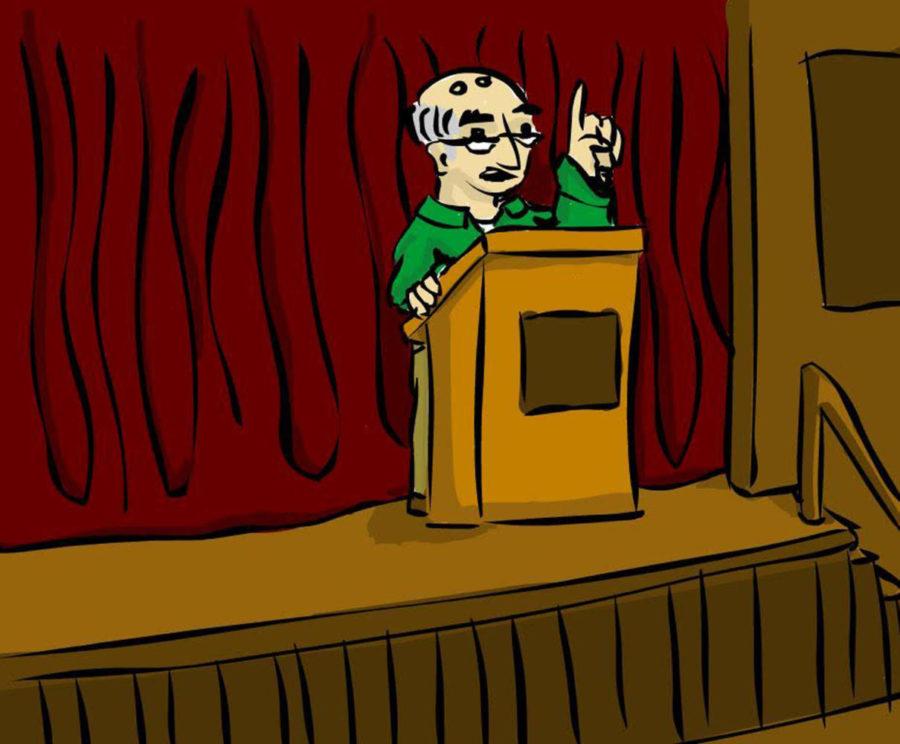Renee Sachs was hardly old enough to read when she realized that, if she made a mistake, it could cost two lives — hers and her aunt’s.
When she was 4 years old, Sachs went to live with her aunt in Vichy, France, so she — a young girl of Jewish descent — could escape the genocide being carried out in the only home she had ever known, Paris.
The atmosphere of the O’Hara Student Center Ballroom was solemn as the audience sat, captivated, listening as her husband, Mr. Sachs, retold her story. About 40 attendees gathered to hear Keith Sachs, a 1965 graduate of Pitt’s College of Business Administration, give his wife a voice. Though she passed away in 2015, Mrs. Sachs had written down her memoirs for the benefit of future generations — a legacy her husband carries on by sharing it with as many people as possible.
Mr. Sachs read her written memoirs aloud and recounted her emotions, beginning the presentation by showing the audience a picture of his wife as a child.
“This beautiful child is going to be the one who guides us through this time in history,” Sachs said, gesturing to a black-and-white childhood photo of Mrs. Sachs at the beginning of his presentation.
When Mrs. Sachs went to live with her aunt in Vichy, she had to quickly become accustomed to the rituals of the Catholic church to hide her secular Jewish upbringing. While at church, she was told that everyone but Catholics were destined to go to Hell and the guilt and fear resonated with her.
“How would you feel if there was a war against the Jews, and you were a Jew?” Mr. Sachs said to the audience.
Mr. Sachs captivated the room with words from both him and his wife as people’s emotions began to show — including some visible tears. The room fell hushed as he gave a warning.
“When you see evil you cannot be silent,” he said.
Mr. Sachs sent Mrs. Sachs’ memoirs to the United States Holocaust Museum in Washington, D.C., after Mrs. Sachs passed away, and he received a response that he proudly recalled.
“‘Now her words will live in perpetuity for scholars and students alike,’” he quoted from a letter from the museum.
Mrs. Sachs’ intention in writing down her memoirs and retelling them on video was to teach younger generations about her experiences. When she was alive, she used to tell her own stories in person, although she never came to Pitt. Mackenzie Dowd, an undecided student, recognized the importance of hearing stories from this era.
“There is not a lot of time to hear this from someone with firsthand knowledge of it,” Dowd said. “[Stories like these teach] our generation about something so devastating that happened to a whole religion and population, so it’s really important to learn about it, to hear about it, even if it’s something that people really don’t want to face.”
Carolyn Hein, a junior environmental science major, said it’s important to realize oppression and persecution don’t manifest in one event — the have happened throughout history — and that is seen in Mrs. Sachs’ story.
“We can connect the oppression of Jewish people in the Holocaust to oppression of women and minorities and everything like that, so it’s an ongoing topic, and it’s important to promote equality by learning about the history of inequality,” Hein said.
Joseph Junker, a co-organizer for the event who works for Pitt’s Office of Institutional Advancement, described how the presentation related to Pitt’s International Week and its theme of displacement.
“Having met Keith this past spring and hearing his story of his wife’s journey as a hidden child and being displaced from her home and living in an orphanage, we thought it was a great tie-in to bring a Pitt alumni back as part of that,” he said.
Mr. Sachs described the day he met his wife — a chance encounter in Central Park in 1968 — as the day his life began. He said Mrs. Sachs became his teacher.
“She taught me about things I never knew existed. Taught me about love, truth, the beauty of the world, to reach into your soul and feel something,” Mr. Sachs said. “I had been chosen for some inexplicable reason to love her.”
Mr. Sachs concluded with Mrs. Sachs’ words about the world during the war, and he warned against letting history repeat itself.
“The biggest sin of the war was not the concentration camps, but the silence. The whole world knew, and was silent,” he said. “Listen, because you can never let that happen again, to any of the world’s children again.”
Editor’s note: An earlier version of this story said the couple donated Mrs. Sachs’ memoirs to La Memorial de la Shoah, a Holocaust museum in Paris. The article has been changed to reflect that Mr. Sachs donated the memoirs to the United States Holocaust Museum in Washington, D.C., after Mrs. Sachs passed away. The Pitt News regrets this error.


